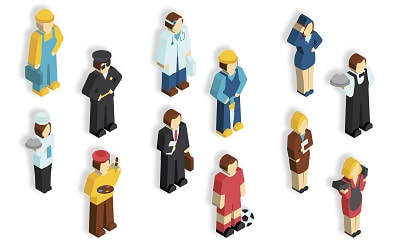OCCUPATIONS
 What occupies your time? What are you occupied by?
What occupies your time? What are you occupied by?The word occupation has its origins in the Proto-Indo-European (PIE) root kap (to grasp) and Latin occupare (to take over, seize, grasp, take into possession, occupy). By the mid-14th century, the English word occupy meant to take possession of, or to take up space or time, or to employ someone; i.e., to take up their time. The word occupation, meaning to be employed in something, is also from the mid-14th century. Here are the origins of some occupations…
Barber comes from PIE bhardha (beard).
Baxter means a female baker.
Broker has the same origin as the word broccoli.
The Latin word carpentarius means wagon-maker (i.e., a cartwright). The Latin word for carpenter is lignarius (from lignum, meaning wood). The Old English word for carpenter is treowwyrhta (tree-wright). So, how did Latin carpentarius become the English word carpenter? A friend suggested that maybe ancient carpentarii earned a bit of money on the side building tables or shelves or sheds when not building wagons. Who knows?
Cosmetician comes from Greek cosmos (the ordered universe), the opposite of Greek khaos (the original state of the universe). A cosmetician is someone who uses cosmetics to bring order to the chaos of your face.
Electrician comes from ancient words meaning petrified tree sap.
Engineer comes from ancient words meaning ingenious.
The Greek words gaia, geo (earth) + ergo (work) combine to make ‘earth worker’ or farmer or the name George.
There was a time when the word occupant also meant prostitute.
I could go on.
Online Etymological Dictionary, https://www.etymonline.com/
Published on July 03, 2020 13:25
No comments have been added yet.



